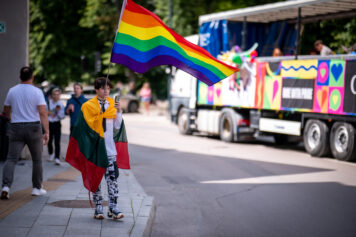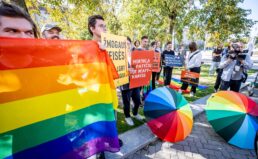Recent developments in Lithuania point to an intensifying debate over LGBTI rights, with anti-LGBTI sentiment gaining prominence in the Baltic nation as the country prepares for its upcoming parliamentary elections.
In August 2024, members of the Lithuanian parliament’s Regional faction proposed legislation that would ban providing any information about LGBTIQ topics to minors in schools without written parental consent. The proposed law would impose fines of up to 1,000 euros for violations.
Jonas Pinskus, chair of the Regional Party, claimed the move was aimed at protecting children and parents’ constitutional rights regarding their children’s moral education. He pointed to similar laws passed in Poland, Slovakia and other EU countries as precedent.
This proposal comes at a crucial time in Lithuanian politics. The next Seimas (parliamentary) elections are scheduled for October 2024, just months away. These elections will determine the composition of Lithuania’s 141-seat unicameral parliament and, by extension, the direction of the country’s policies on issues including LGBTI rights.
The current government, led by Prime Minister Ingrida Šimonytė of the conservative Homeland Union – Lithuanian Christian Democrats (TS-LKD), has been in power since 2020. The coalition also includes the Liberal Movement and the Freedom Party, the latter being known for its more progressive stance on LGBTI issues.
However, the government’s initiatives on LGBTI rights have faced strong opposition. Živilė Pinskuvienė, a wife to Jonas Pinskus, a mayor of Širvintos District and a vocal critic of the government’s LGBTI policies, has not only suggested that these initiatives could become a major election issue but has also vehemently criticized the government’s approach.
In a scathing opinion piece, Pinskuvienė ripped apart a recent Kaunas University of Technology researchers’ inquiry into LGBTI rights. She characterized the “Effective Protection of LGBT Rights Through Inter-Institutional Cooperation” project, funded by the Ministry of Social Security and Labor and involving the Seimas Ombudsmen’s Office, Vilnius City Municipality, Kaunas University of Technology and led by Lithuanian Gay League, as a “degradation of central government.”
Pinskuvienė argued that with Lithuania facing serious economic and social challenges, including a struggling healthcare system and police shortages, the focus on LGBT issues represents a gross misplacement of priorities. She went so far as to suggest that such initiatives could be seen as “a deliberate attempt to harm the state.”
“When will this government hit rock bottom?” Pinskuvienė asked rhetorically in her critique. She called for investigations into whether public funds were being appropriately used for such projects, urging the State Control to examine the allocation of state funds and for the Central Electoral Commission and Special Investigation Service to evaluate whether these actions comply with Lithuanian laws.
Pinskuvienė’s harsh criticism highlights the deep divisions in Lithuanian society over LGBTI rights. While some see initiatives like the inter-institutional cooperation project as necessary steps towards equality and compliance with EU standards, others view them as threats to traditional values and a distraction from more pressing national issues.
“The upcoming Seimas elections can be a decisive moment when voters can express their opinion both about the so-called conservatives and their friends – the Freedom Party,” Pinskuvienė wrote. “I want to believe that finally the people of the country will wake up from their prolonged lethargy and realize that it only depends on them – whether Lithuania will rise from the ruins or only its name will remain…”
This statement underscores how LGBTI rights could become a wedge issue in the upcoming elections, with more conservative forces potentially using opposition to LGBTI initiatives as a rallying cry for their base.
The debate is further complicated by Lithuania’s broader political context. The country faces significant challenges, including economic pressures, demographic decline, and security concerns related to its position bordering Russia and Belarus. How parties balance these issues with social questions like LGBTI rights could significantly impact their electoral fortunes.
Moreover, the elections will take place against the backdrop of regional trends. Neighboring countries like Poland and Hungary have seen conservative governments implement restrictive policies on LGBTI rights, while facing criticism from EU institutions. How Lithuania navigates these currents could have implications beyond its borders.
As the election campaign heats up, it’s likely that the debate over LGBTI rights will intensify. This debate has recently taken a significant turn, with the government seeking constitutional clarity on key LGBTI issues.
In February 2024, the Constitutional Court of Lithuania agreed to hear the government’s request regarding a provision in the Law on the Protection of Minors against the Detrimental Effect of Public Information. This provision prohibits disseminating information to minors that “expresses contempt for family values” or encourages an LGBTIQ family concept. The government’s move came in response to a European Court of Human Rights ruling that found Lithuania had violated the rights of author Neringa Macatė by restricting her LGBTQ-inclusive children’s book.
Furthermore, in May 2024, the government decided to appeal to the Constitutional Court regarding the absence of a same-sex partnership institute in Lithuania. The appeal asks the court to evaluate whether the current Civil Code, which only recognizes partnerships between a man and a woman, is in line with the Constitution. This move has been criticized by some, including President Gitanas Nausėda, who argued it demonstrates the parliament’s powerlessness to address the issue legislatively.
These appeals to the Constitutional Court underscore the complex and contentious nature of LGBTI rights in Lithuania. They also highlight how the issue has become a focal point of political and legal debates, likely to play a significant role in the upcoming Seimas elections.
With ultra-conservative and populist forces gaining ground and pro-LGBTI initiatives facing strong opposition, the outcomes of these Constitutional Court cases could significantly shape the future of LGBTI rights in Lithuania. As the country navigates these complex issues, it finds itself at the center of a broader regional struggle over democratic values and human rights, with the upcoming elections set to be a crucial turning point.




